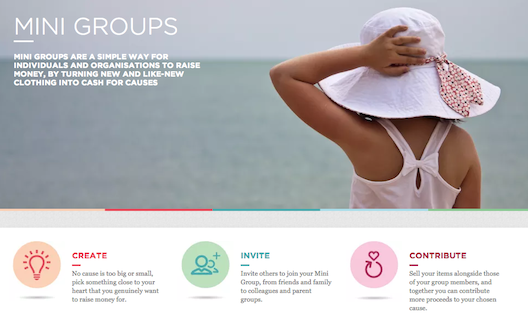Middle East kids fashion marketplace off to a strong start


E-commerce has proved once again to be a promising industry for entrepreneurs in the Arab region.
After witnessing the rise of many online retail services providing children’s items and products such as Mumzworld, new entrepreneurs are hitting the market with a service altogether new to the Arab region.
Launched in early 2014, Mini Exchange works as an outlet for retailers, and an online marketplace for parents to buy and sell clothing and accessories, all of them new or like-new. Hand-me-down clothes must have been de rigeur for founder Sarah Appleton, a British expat in Dubai who quit her job at Deloitte to start Mini Exchange; growing up with six siblings, she surely learned the value of gently used clothing items, sometimes worn only for a few months before a child grew too big.
The platform solves two main problems for both parents and brands. Through Mini Exchange, parents can sell outfits that were barely worn by their growing kids, and brands can re-sell their stock, which then allows parents to dress their kid in high-end brands.
It is a win-win situation for everyone. “When the sales season comes to an end in the market, brands give us their stock, instead of sending them to waste,” explains Appleton.

Appleton and her partner invested from their own pockets to establish and build their startup, and chose to delay their first fundraising round until early next year. “We want to see how far we can drive this on our own before taking on any investment,” says Appleton.

Buy and sell from home
The way Mini Exchange works is giving buyers access to discounted brands and designer clothes. Items are collected from sellers – whether parents or stores – for free by an Aramex representative and quality-checked by the team, says Appleton on a Skype call with Wamda. The Mini Exchange team then evaluates the items and suggests a price to the seller. If the seller is not happy with the price they can either take the goods back or choose to donate them to a charity supported by the company. Mini Exchange then professionally photographs the items lists them on the site, and delivers to buyers.
The seller receives 50% of the sale price on each item sold. The money can be spent on the site, transferred via PayPal, or donated to charity via the platform. If the amount exceeds 1,000 AED (~$272 USD) they seller can collect a check.
As the business model relies on collecting 50% of every item sold through the platform, products that are of a low cash value are not worth listing. High street brands like Zara, Gap, or United Colors of Benetton represent the low end of the spectrum, which runs all the way up to Dior dresses.

Small successes in nine months
So far, the future is looking bright for the platform. Mini Exchange has signed partnerships with over 20 leading international brands, and done business with 150 multi-brand local boutiques and parents. The team is also currently receiving 1,000 items from parents and brands every month.
Based on these numbers, Appleton says they will be moving from storage facilities to renting warehouses very soon. “We are expecting the number of items we receive from parents to increase by 10 times in the coming months,” she adds.
Almost one month after launch, the platform won third at the ArabNet Beirut StartUp Demo Competition and the PITME Labs Middle East Impact & Ingenuity Awards earlier this year.

A charity twist
Mini Exchange also gives users the opportunity to support causes across the Middle East while “clearing out their kids’ wardrobes.” The company has tied up with three organizations – START, Little Wings, and Action Care – all of which work to help and support children across the region. Sellers can make a difference and support their communities by listing clothes and donating the profits directly to one of these causes.
The website also allows individuals and organizations to support their favorite causes by creating a ‘Mini Group’. Users can invite people in their networks to clear out their kids’ wardrobes by listing items on the site, and donating profits to any cause, whether supporting victims of a natural disaster, or trekking the Himalayas with your friends.


